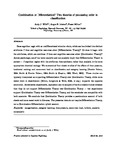Combination or Differentiation? Two theories of processing order in classification
Date
2015-08Author
Subject
Metadata
Show full item recordAbstract
Does cognition begin with an undifferentiated stimulus whole, which can be divided into distinct attributes if time and cognitive resources allow (Differentiation Theory)? Or does it begin with the attributes, which are combined if time and cognitive resources allow (Combination Theory)? Across psychology, use of the terms analytic and non-analytic imply that Differentiation Theory is correct-if cognition begins with the attributes, then synthesis, rather than analysis, is the more appropriate chemical analogy. We re-examined four classic studies of the effects of time pressure, incidental training, and concurrent load on classification and category learning (Kemler Nelson, 1984; Smith & Kemler Nelson, 1984; Smith & Shapiro, 1989; Ward, 1983). These studies are typically interpreted as supporting Differentiation Theory over Combination Theory, while more recent work in classification (Milton et al., 2008, et seq.) supports the opposite conclusion. Across seven experiments, replication and re-analysis of the four classic studies revealed that they do not support Differentiation Theory over Combination Theory-two experiments support Combination Theory over Differentiation Theory, and the remainder are compatible with both accounts. We conclude that Combination Theory provides a parsimonious account of both classic and more recent work in this area. The presented data do not require Differentiation Theory, nor a Combination-Differentiation hybrid account.
Collections
Publisher
Place of Publication
Journal
Volume
Pagination
Author URL
Recommended, similar items
The following license files are associated with this item:


